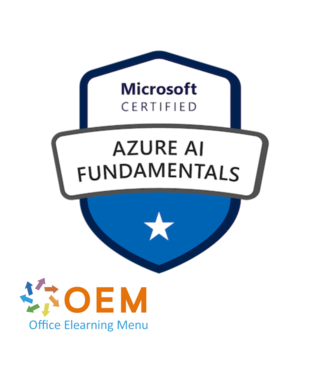Examen AI-900 Microsoft Azure AI Fundamentals
Dit examen is een kans om kennis aan te tonen van veelvoorkomende ML en AI workloads en hoe deze te implementeren op Azure. Het is bedoeld voor kandidaten met zowel een technische als niet-technische achtergrond.
Kandidaten voor dit examen moeten basiskennis hebben van machine learning (ML) en artificial intelligence (AI) concepten en gerelateerde Microsoft Azure services. Ervaring op het gebied van data science en software engineering is niet vereist; enige algemene programmeerkennis of -ervaring zou echter nuttig zijn.
Skills measured
Audience profile
This exam is an opportunity for you to demonstrate knowledge of machine learning and AI concepts and related Microsoft Azure services. As a candidate for this exam, you should have familiarity with Exam AI-900’s self-paced or instructor-led learning material.
This exam is intended for you if you have both technical and non-technical backgrounds. Data science and software engineering experience are not required. However, you would benefit from having awareness of:
- Basic cloud concepts
- Client-server applications
You can use Azure AI Fundamentals to prepare for other Azure role-based certifications like Azure Data Scientist Associate or Azure AI Engineer Associate, but it’s not a prerequisite for any of them.
Skills at a glance
- Describe Artificial Intelligence workloads and considerations (15–20%)
- Describe fundamental principles of machine learning on Azure (20–25%)
- Describe features of computer vision workloads on Azure (15–20%)
- Describe features of Natural Language Processing (NLP) workloads on Azure (15–20%)
- Describe features of generative AI workloads on Azure (15–20%)
Describe Artificial Intelligence workloads and considerations (15–20%)
Identify features of common AI workloads
- Identify features of content moderation and personalization workloads
- Identify computer vision workloads
- Identify natural language processing workloads
- Identify knowledge mining workloads
- Identify document intelligence workloads
- Identify features of generative AI workloads
Identify guiding principles for responsible AI
- Describe considerations for fairness in an AI solution
- Describe considerations for reliability and safety in an AI solution
- Describe considerations for privacy and security in an AI solution
- Describe considerations for inclusiveness in an AI solution
- Describe considerations for transparency in an AI solution
- Describe considerations for accountability in an AI solution
Describe fundamental principles of machine learning on Azure (20–25%)
Identify common machine learning techniques
- Identify regression machine learning scenarios
- Identify classification machine learning scenarios
- Identify clustering machine learning scenarios
- Identify features of deep learning techniques
Describe core machine learning concepts
- Identify features and labels in a dataset for machine learning
- Describe how training and validation datasets are used in machine learning
Describe Azure Machine Learning capabilities
- Describe capabilities of automated machine learning
- Describe data and compute services for data science and machine learning
- Describe model management and deployment capabilities in Azure Machine Learning
Describe features of computer vision workloads on Azure (15–20%)
Identify common types of computer vision solution
- Identify features of image classification solutions
- Identify features of object detection solutions
- Identify features of optical character recognition solutions
- Identify features of facial detection and facial analysis solutions
- Describe capabilities of the Azure AI Vision service
- Describe capabilities of the Azure AI Face detection service
Describe features of Natural Language Processing (NLP) workloads on Azure (15–20%)
Identify features of common NLP Workload Scenarios
- Identify features and uses for key phrase extraction
- Identify features and uses for entity recognition
- Identify features and uses for sentiment analysis
- Identify features and uses for language modeling
- Identify features and uses for speech recognition and synthesis
- Identify features and uses for translation
- Describe capabilities of the Azure AI Language service
- Describe capabilities of the Azure AI Speech service
Describe features of generative AI workloads on Azure (15–20%)
Identify features of generative AI solutions
- Identify features of generative AI models
- Identify common scenarios for generative AI
- Identify responsible AI considerations for generative AI
Identify capabilities of Azure OpenAI Service
- Describe natural language generation capabilities of Azure OpenAI Service
- Describe code generation capabilities of Azure OpenAI Service
- Describe image generation capabilities of Azure OpenAI Service


